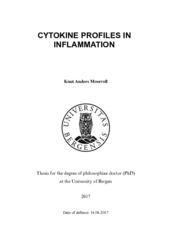Cytokine profiles in inflammation
Abstract
Inflammation is a complex tissue response to harmful stimuli such as microorganisms, damaged or dead cells, or irritants. The inflammatory process can be initiated by many different diseases, including thromboses, neoplastic diseases, and infections. In the present studies, the serum profiles of inflammation-associated soluble mediators were analysed in patients with multiple myeloma undergoing stem cell mobilization, patients with venous thromboses, as well as patients with severe bacterial infections, all treated at Haukeland University Hospital. The serum and plasma levels of cytokines, adhesion molecules, and matrix metalloproteases were measured, and the possible diagnostic or prognostic use of these mediators as broad mediator profiles was explored. Cytokines are essential in all stages of inflammation, from initiation to resolution. Adhesion molecules, including the soluble, as well as cell-bound, forms, are essential for cell-to-cell communication as well as for leukocyte migration, whereas matrix metalloproteases are important modulators of other soluble mediators. The recent development of multiplex technology has made it possible to determine the systemic (serum or plasma) levels of several mediators in small sample volumes. Up to 40 different inflammatory mediators were assessed, and using multiplex technology, broad cytokine profiles during inflammatory responses elicited by different clinical causes were investigated. Unsupervised hierarchical clustering was used to study the combined effect of several mediators in inflammatory networks. Autologous stem cell transplantation is the initial treatment of patients younger than 65 years with multiple myeloma, and the broad inflammatory response during stem cell mobilization has not been studied previously. Results here showed that the cytokine network was altered during stem cell mobilization and harvesting. Unsupervised hierarchical clustering suggested that patients with relatively low chemokine levels in stem cell grafts had a poorer prognosis. In addition, patients with deep venous thrombosis (DVT) demonstrated a broad inflammatory response during the acute phase of the condition, compared to healthy controls. When investigating patients with suspected thrombosis, the levels of only four inflammatory mediators showed statistically significant differences in patients with and without thrombosis. Unsupervised hierarchical clustering revealed that the combined use of these inflammatory mediators could identify patient subsets that differed significantly in DVT frequency. The cohort of patients with sepsis also showed a broad inflammatory response. The levels of 16 inflammatory mediators were found to differ significantly during severe bacterial infections in sepsis patients with bacteraemia, compared with those without bacteraemia, with vascular cell adhesion molecule-1 (VCAM-1) as the mediator showing the most robust difference in a multivariate regression model. Unsupervised hierarchical clustering with six mediators differentiated 98% of patients with bacteraemia. Taken together, these study findings suggest that systemic mediator profiles should be further investigated as possible diagnostic and prognostic tools in routine clinical practice.
Has parts
Paper I: Stem cell mobilization and harvesting by leukapheresis alters systemic cytokine levels in patients with multiple myeloma. Mosevoll KA, Akkök ÇA, Hervig T, Melve GK, Bruserud Ø, Reikvam H. Cytotherapy. 2013 Jul; 15(7):850-60. Full-text not available in BORA. Paper available here: https://doi.org/10.1016/j.jcyt.2013.02.008Paper II: Systemic levels of the endothelium-derived soluble adhesion molecules endocan and E-selectin in patients with suspected deep vein thrombosis. Mosevoll KA, Lindås R, Wendelbo Ø, Bruserud Ø, Reikvam H. Springer plus. 2014 Sep 30; 3:571. http://hdl.handle.net/1956/8633
Paper III: Altered plasma levels of cytokines, soluble adhesion molecules and matrix metalloproteases in venous thrombosis. Mosevoll KA, Lindås R, Tvedt TH, Bruserud Ø, Reikvam H. Thrombosis Research. 2015 Jul; 136 (1):30-9. Full-text not available in BORA. Paper available here: https://doi.org/10.1016/j.thromres.2015.04.002
Paper IV: Cytokine profiles can differentiate bacteraemia in patients with serious infections. Mosevoll KA, Skrede S, Lunde Markussen D, Fanebust HR, Flaatten H, Aßmus J, Reikvam H, Bruserud Ø. Manuscript. Full-text not available in BORA.
